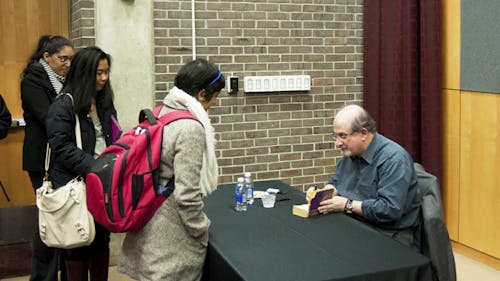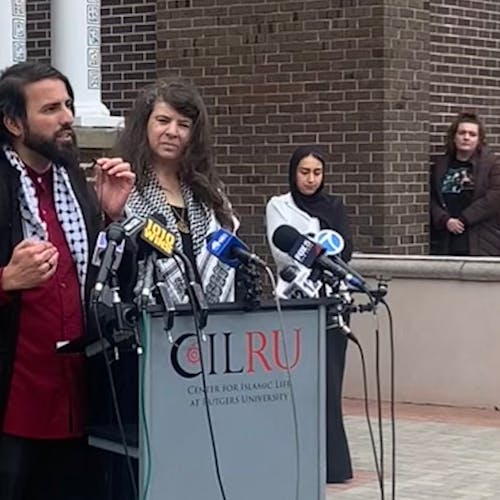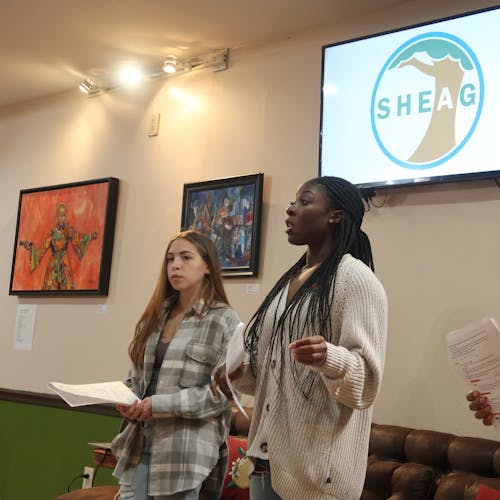Rushdie shares excerpts from award-winning works

Salman Rushdie, winner of the Man Booker Prize for Fiction, Knight of the Realms of England and previously the subject of an international political dispute, strolled into the Rutgers Student Center on the College Avenue campus yesterday with several of Rutgers’ academic deans following him.
Rushdie spent the majority of the night reading from three of his books, in reverse chronological order: “Joseph Anton,” his recent memoir; “The Satanic Verses,” for which he was sentenced to death by the Ayatollah Ruhollah Khomeini; and “Midnight’s Children,” which catapulted him to literary fame.
He began with the former, highlighting a story about a trip to New York City to speak at Columbia University two years after Khomeini issued the fatwa.
Rushdie frequently added dashes of comedy to his recital, often gesturing to indicate what exactly was going on in the story.
He drew a particularly strong wave of laughter from his audience while reading about his interaction with an officer in the New York Police Department, who coordinated a grandiose motorcade through the city.
“If you were the President of the United States, sir, we’d close down a whole bunch of these side streets here. We’d have snipers along the rooftops,” Rushdie read, as the officer. “But in your case, we didn’t think that was necessary because you’d look too conspicuous.”
While describing the ostentatious vehicles that were to carry him to Columbia, Rushdie paused and smiled at his audience.
“It reminds me of ‘Monty Python’s Flying Circus,’” he said.
After concluding the section, Rushdie said the U.S. unceremoniously threw him out of the country immediately after he was finished speaking at Columbia.
He then opened “The Satanic Verses” and read a passage that contained a vivid sex scene — the first he had ever written.
“I would [say] sex scenes best take place off stage,” he said. “And then I thought ‘You’ve never done this, you’d better do this.’”
The narrator, who describes his parents’ sexual rendezvous, is just as uncomfortable as the author, Rushdie said.
As the narrator alternated between explicitness and roundabout descriptions of the act, he finally crafted a vivid analogy between his parents’ love and the spice warehouse in which it was made.
“So profoundly had sweat and blood and the secretions of their bodies mingled with the fetid atmosphere of cardamom and cumin ... [that] the spice stacks themselves ... were crushed between legs and feathers and thighs [so] that they sweated pepper and spice sweat,” he read.
The story takes place in southern India, where the two lovers are members of extremely small Catholic and Jewish minorities.
“The purpose was to try and show that, very powerfully ... you could actually grow the entire story of the country out of this one extremely marginal individual,” Rushdie said.
He concluded with a passage from “Midnight’s Children,” which was awarded the best Booker Prize winner in the award’s first 40 years of existence by those who bestow it. The excerpt also addressed romance and courtship among children rather than passionate lovers.
The novel’s protagonist, Saleem, was switched at birth with the child of a wealthy family, which lays the foundation for the remainder of the plot. Rushdie read the elaborate story of Saleem’s parents discovering that he is not their biological son.
While reading, Rushdie adopted the accents of his characters, instantly switching from the tone of a cruel geography teacher to nervous students to a 10-year-old boy in agony.
After the tip of Saleem’s middle finger is chopped off and he is sitting dazed in the hospital while his parents encounter their revelation, Rushdie concluded with a single line that drew applause from the audience.
“Most of what matters in life takes place in your absence,” he said.
Rushdie spoke as part of the Writers at Rutgers Reading Series. Mark Doty, a professor in the English Department who coordinated the event, said he aims to bring highly regarded writers from around the world to New Brunswick.
“It is a crucial thing for writers around the world to come to our community,” Doty said in his introduction. “Literature is made by people somewhat like ourselves: living and breathing persons who are neither dead nor impossibly far away.”
Emma Meany, a School of Arts and Sciences junior, said she attended the event to fulfill a requirement for transfer students.
“This is one of our [required] events,” she said. “But it’s also really interesting.”



